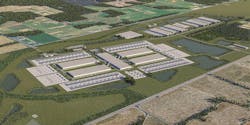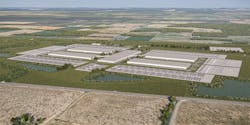Meta Sees $10B AI Data Center in Louisiana Using Combo of Clean Energy, Nuclear Power
Meta’s latest $10 billion planned investment in Richland Parish, Louisiana is a major event in both the global company’s development and the state’s economic and technological future.
This mega-development, a 4-million square foot, 2,250-acre data center campus, is planned to be the foundation of Meta’s AI infrastructure, which the company wants to use to make its platforms and Louisiana into the world’s innovation hotspot.
The most innovative aspect of this work is Meta’s use of nuclear power to power its high-energy workload, a step towards a radical change in how companies approach sustainability and grid reliability.
The Richland Parish data center is an example of how private sector investments can make profits in a way that respects the environment and promotes economic development while helping meet decarbonisation targets worldwide.
Scaling Up Hyperscale Data Center Goals
Meta’s Richland Parish data center will be more than just another data center; it will be the company’s largest, and the power behind the AI workloads that power Facebook, Instagram, WhatsApp, Messenger, and Threads.
The $10 billion investment in this giant data/AI factory will create jobs for more than 500 direct employees, more than 1,000 indirect jobs, and 5,000 construction workers.
This is just the initial investment, as the project is to spur growth across northeast Louisiana, bringing new industries, talent and innovation to the region.
Firms including Turner Construction Company, DPR Construction, and M. A. Mortenson will build the data center campus. Louisiana Governor Jeff Landry expressed his optimism with the project, saying:
Today, Louisiana begins a new chapter. Today, we are delivering new jobs and economic growth on a scale unimaginable before we took office. Meta’s investment establishes the region as an anchor in Louisiana’s rapidly expanding tech sector, revitalizes one of our state’s beautiful rural areas, and creates opportunities for Louisiana workers to fill high-paying jobs of the future. I thank Meta for their commitment to our state, and to the State Legislature for positioning Louisiana to win this project by passing new tax reform legislation that attracts capital investment and improves Louisiana’s business tax climate.
While data center development in rural areas often raises the question of where will the developing bodies find technical staff, in this case the Louisiana Community and Technical College System (LCTCS) has committed $250000 in Workforce Rapid Response Funding to the local Delta Community College.
To start, the college will scale up its construction trades programs and has plans to partner with other institutions to develop programs to educate students focused on data center operations.
Richland Parish Supervisor Joey Evans is enthusiastic about what this means for the future of the local communities, saying:
The parish is excited about the project and we look forward to assisting in every way. I am so proud of the collaboration and cooperation among our state, regional, parish and local partners. The manner in which the communities of Rayville, Holly Ridge and Delhi came together to make this project a reality speaks volumes about our parish’s ability to rise to any challenge.
Meta’s data center is about to change Richland Parish and surrounding areas, with over $200 million being allocated for local infrastructure like roads and water, adding to local resources and providing opportunities for small businesses and workers.
The partnerships with colleges such as Delta Community College will add to the workforce readiness. It all amounts to a significant effort to provide a talent pool to back up construction and long-term maintenance operations, more than just a short term construction job boost to the local economy.
Taking the Renewable Approach to Powering Data Centers
Meta’s efforts to build an ecological approach to powering data centers are at the heart of the project. Meta and Entergy Louisiana will also match 100% of the data center’s electricity usage with clean, renewable power in partnership.
That will be done by adding at least 1,500 MW of new renewable energy to the grid through Entergy’s Geaux Zero initiative.
In addition, Meta has committed up to $1 million per year to Entergy’s "The Power to Care" initiative for low-income rate payers to reinforce the company’s commitment to community improvement.
It is important to note that Meta’s sustainability initiatives go beyond just renewable power and also have a focus on water management.
One of the goals of their data center designs is to recover more water than the building uses, and make the data center an example of sustainable operation.
Meta's Nuclear Energy RFP
While renewable energy such as wind and solar are central to Meta’s sustainability strategy, the company recently announced it would be issuing an RFP for nuclear power developers.
Meta’s nuclear RFP calls for 1 to 4 gigawatts (GW) of new nuclear generation capacity starting in the early 2030s, a timeline that aligns with what is being proposed by the latest nuclear power efforts, from restarting shuttered power plants, to SMRs and fusion. All with the target of being able to deliver stable, baseload power to AI workloads and their electric grids.
That Meta has long invested in other forms of renewable energy, such as large scale solar and wind projects, gives them experience that boosts their targeted effort to see nuclear power development.
Meta will be able to build on that experience to meet the industry's upcoming energy demands with nuclear energy. The hyperscaler knows that the issues that need to be addressed in nuclear development are clearly defined:
- · Reliability: Unlike wind and solar, nuclear power is weather-independent and that is important for 24/7 data centers.
- Scalability: Big nuclear reactors can meet the power requirements of huge hyperscale data centers and also improve grid stability.
- Decarbonization: A zero-emissions power option, nuclear power meets Meta’s long-term sustainability goals.
In investing in nuclear power, Meta is trying to meet the gap between short-term operations and longer-term decarboniation ambitions.
Nuclear power’s ability to be interconnected with current grids and to feed the battery and hydrogen generation markets needs also positions it as an essential, if not necessary, part of the switch to cleaner energy.
Nuclear Energy Challenges
The experiment with nuclear power is not an easy one. Nukes are capital-heavy, take years to develop, entail regulatory challenges and need sufficient space to operate; they also demand careful planning and coordination.
Meta’s RFP is looking for collaborators who can handle all of this – designers, financiers, builders, and operators who will be able to design, build, and run nuclear power plants at cost savings by scaling through strategic planning.
Details on the RFP are being held under NDA, with interested companies required to apply and execute the Meta NDA template by January 3rd, 2025, with their initial proposals filed by February 7th.
Acting Locally, Thinking Globally In The Race for Clean Power
This energy strategy is not unlike Meta’s past attempts in the renewable energy space, where the company had been able to take advantage of innovative contracting solutions to create value and savings.
Applying these same methods to nuclear power, Meta aspires to bring next-generation nuclear technologies on track and make them economically and environmentally sustainable.
The pursuit of nuclear energy is more than an energy direction change: it is a creative answer to the needs of AI and digital technology. In bringing clean energy to its operations, it is a significant step forward in the path to a greener, connected future.
At a global level, Meta’s nuclear RFP could be a precedent for corporate engagement with energy infrastructure construction. In supporting nuclear power, Meta is not only reinforcing its own sustainability agenda, but joining the industry’s collective efforts to diversify and decarbonize electricity grids.
The scalability of nuclear would open new doors to other energy-intensive industries from production to transport. For rural areas, the local development of the nuclear power infrastructure brings with it the potential for other industrial development, especially as businesses look to bring heavier industry back onshore.
In sum, the $10 billion Louisiana investment by Meta isn’t just about a data center: it’s an example of how technology companies can take the forefront in sustainability, economic development and innovation.
Whether that be the creation of thousands of jobs or nuclear-powered energy transformation, this project represents the data center industry’s drive to create a durable and sustainable digital economy. As Entergy Louisiana President and CEO Phillip May said:
This partnership underscores Entergy Louisiana’s commitment to powering progress and driving innovation. By supporting this transformational investment, we are not only delivering the energy needed today, but also building the infrastructure that will support a brighter, more sustainable future for all of Louisiana. Together, we’re laying the foundation for economic growth that will benefit generations to come. We could not be more proud to play a critical role in this monumental endeavor.
About the Author





